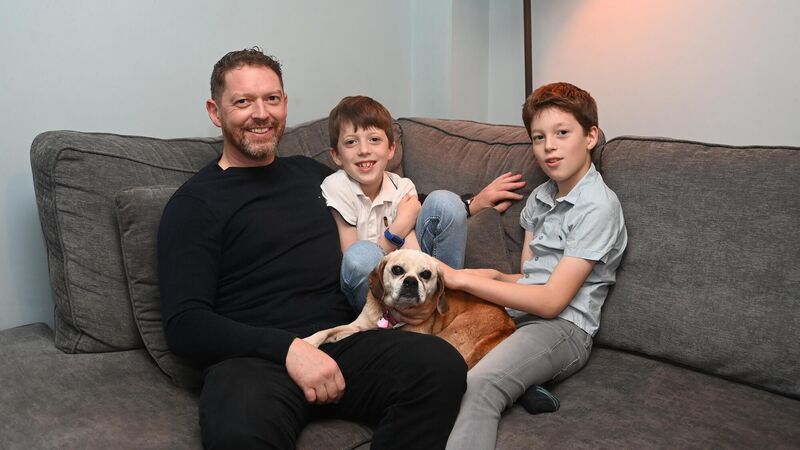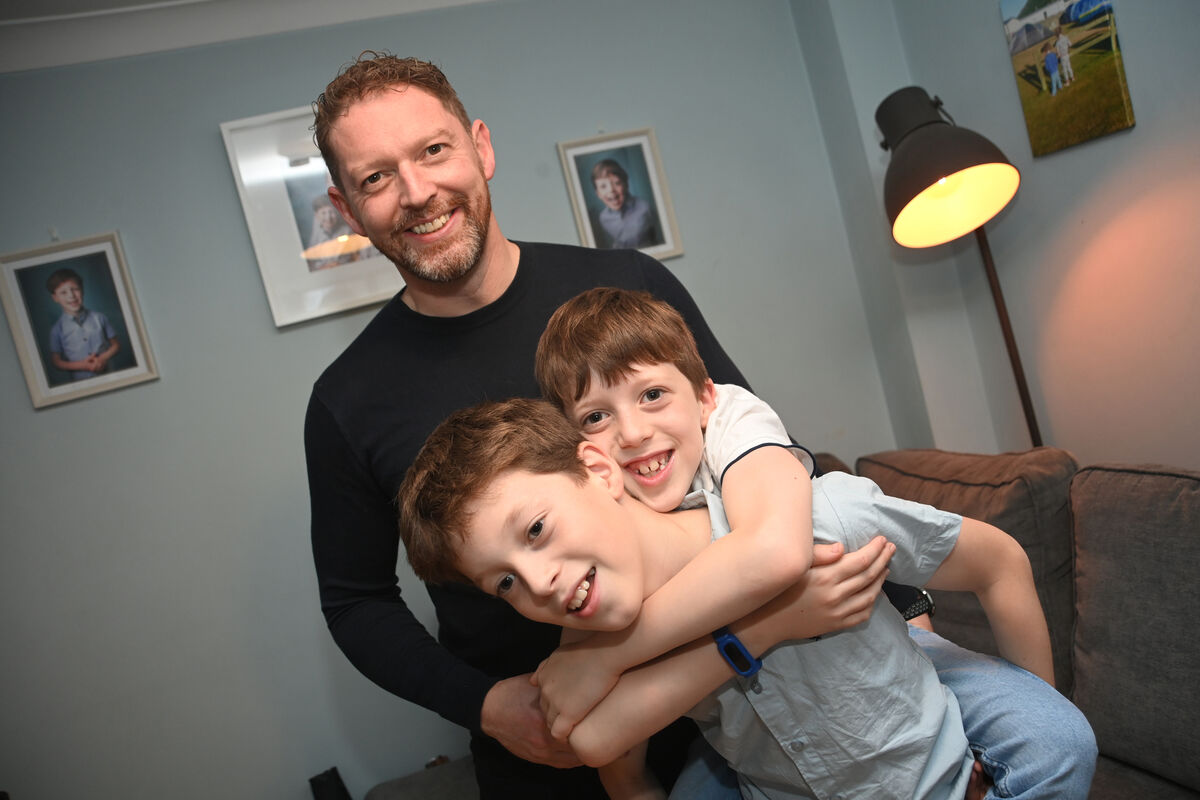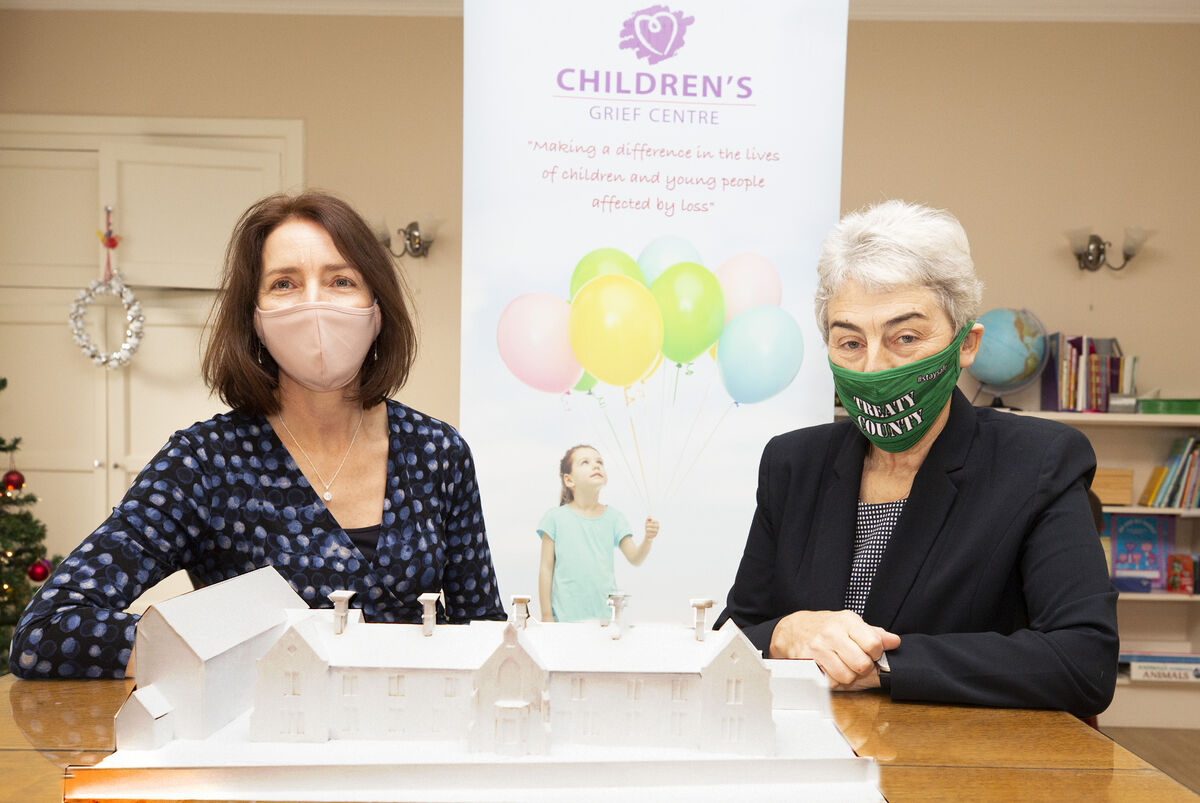Stephen Teap on his sons' grief: 'It comes back to the sharing of stories, photos. It’s the best you can do'

Stephen Teap at home with sons Noah and Oscar and dog Layla. Picture: Larry Cummins
As the nation mourns the passing of Vicky Phelan. Stephen Teap, another husband and father left bereft by the CervicalCheck scandal, talks to Helen O’Callaghan about guiding his children through the loss of their mother.
It was a heartbreaking question, one you wish no little boy had to ask. But Stephen Teap welcomed his seven-year-old’s query: “What was it like to live with Mum?”
Noah was only two when his mother, Irene, passed away in 2017 from cervical cancer. For Stephen — whose other son, Oscar, is 9 — always keeping the dialogue open with his children about their mother has been key to helping them grieve.
“I’ve always encouraged dialogue so they’re not afraid to raise the conversation. In an age-appropriate way, I’ll ask if they’re thinking about their mum, if they’re upset about Mum.”
For the Carrigaline-based dad, children’s grief is something he has had to “constantly figure out as I go along”.
The biggest eye-opener has been how children grieve differently from adults: “Because my boys started this journey so young, their grief is
constantly evolving.
"As their minds, vocabulary, and knowledge of the world expands, they’ve a deeper understanding. Their emotions are constantly renewing.”
He’s now having conversations with Noah that he had with Oscar two years ago.
“Their questions get more detailed, their ability to understand more in-depth and the answers bring emotions.”
The boys are doing well, immersed in school and extra-curricular activities. “I’m busy with their schedules. The extra-curricular activity has taken over, which is great.”
Both boys play hockey and rugby. They are also learning how to play the piano.
“They love hockey. I help out with the coaching. Oscar recently jumped up an age group — he’s with the under-11s. So we reached a
compromise: I coach the under-11s one week, and the next I coach the under-9s with Noah.”
How siblings can help each other
Reaching a milestone can often trigger a question, a sadness, a wondering about their mum.
“When Noah returned to school in September, he was more aware of his family versus those around him, that he was the only person in his class without a mum.
"It was really tough to hear. I tried to explain there are all different types of families, some have just grandparents, some have only a mum and no dad.”
Poignantly, Oscar also tried to help Noah.
“Oscar was engaging in the conversation, listening to what I was saying, listening to how Noah was hurting and trying to add his bit. He was saying ‘yes, some people have two mums and two dads’.”

Stephen sees Oscar’s helping his brother through his sadness as another step in his older son’s grief journey.
“It put Oscar in a space where he was able to talk about his mum, feel a closeness to her and sadness about her, without being in the depths of emotion about it. At the same time, he was helping his brother. The importance of that — it was an experience that stood to him.”
He feels his younger son woke up sad that day and it stuck for the day.
“We looked at photos of his mum before bedtime that evening. I was trying to keep the conversation going so I could dull down the sadness. He just wanted to express his emotions and cry.”
For Stephen, it was “terribly sad and heartbreaking".
I was shook for a few days after. Noah woke up the next day, 100%, happy. I was on half-percent battery — it knocks you out as a parent.
His heart breaks too that Oscar — four when Irene died — doesn’t have as many memories of her as Stephen had expected.
“He tells me he has fewer and fewer memories of her. He can’t remember her voice anymore. That was heartbreaking to hear. I
always thought he was old enough to remember, but clearly, he wasn’t.”
It’s another vital reason to keep the conversations about Irene flowing.
“Oscar only remembers the stories I’ve told him — they almost have become his memory. So it comes back to that sharing of stories, looking at photos. You’re creating memories for them. It’s the best you can do.”
‘Children want the truth’
Sr Helen Culhane, CEO of Limerick-based Children’s Grief Centre, has worked with bereaved children for 20 years. Grief is part of life, she says.
“Grief is a normal reaction to the death of a loved one. People panic around bereavement. I say ‘let’s take a breath’.” She quotes the late queen Elizabeth’s words: ‘Grief is the price we pay for love.’
Sr Helen has a vivid childhood memory of her mother sewing a diamond-shaped piece of black cloth onto her father’s sleeve after a relative died.
“As a child, seeing a man with a diamond on his coat, I knew he was bereaved. It made us more sensitive. Now people try to
protect children from grief. When a child is grieving, they try to make them feel better by doing stuff, changing the subject. Yet what children want is the truth. They’re looking for someone to listen.”
The Children’s Grief Centre opened 13 years ago and used to see children from the Midwest region but now they are travelling from “Cork, Kerry, Galway, and Kildare”.
A psychotherapist, play therapist and social worker, Sr Helen says she and the Centre’s volunteers call themselves support workers.
“Counselling is not what we do. There’s nothing wrong with the child. They’re grieving — they don’t need therapy or counselling. A lot of adults think children don’t grieve, or that they get over it, but we realise they do grieve and it’s normal. What we provide is a listening ear.”
Sr Helen finds children, up to about 14 years, don’t have words to put on grief they’re feeling. “They act out, they have problems sleeping, they eat more, they eat less — it varies.

"Another classic is saying they have a tummy ache or they feel like they’re choking — the grief gets stuck.”
And yet it’s not a good idea to bring a child to a support centre too soon following bereavement.
“Because they haven’t yet experienced the absence of the person. Our bodies close down when someone dies. We’re in shock for about six weeks. Then the shock wears off — the feelings come. Children can feel anger, guilt.”
She recalls a teenage boy, who frequently argued with his mother. She got cancer and he wondered if it was his fault.
“Adults say ‘why would a child think that?’” But by listening to children, you give them space to begin processing their grief and a lot happens then, says Sr Helen.
She recalls a boy who’d lost his dad, who was worried he and his siblings would be orphaned.
“He said ‘what’ll happen if Mum dies? Don’t tell me she won’t — look what happened my father’. This is the insecurity of bereaved children — the carpet is pulled from under them.”
By asking what would help with this worry, the conversation turned to who he’d like to mind him and his siblings, if the worst happened. “He said he’d like his granny because she had loads of experience, having reared 10 children. And his uncle because he liked him, and his uncle’s children were his own age.”
The boy’s mum agreed to talk to his granny and uncle and formalised the potential arrangement with her solicitor. This child’s feelings of insecurity were completely normal in the context of his grief.
“There were two parents and now there was one.”
When parents lose their partner, they naturally struggle.
“Of course, they have to do their grieving,” says Sr Helen, who knew one bereaved mum who lay on the couch all day while her children were in school but was up when they got in.
“The children need to see ‘my dinner’s on the table, my clothes are washed’. Because if the surviving parent isn’t coping, the child thinks ‘oh, we’ve no one now’.”
“Massively so,” says Stephen Teap when I ask if he’s grieving for his boys’ loss as much as his own.
“They’re the ones who go around every day without their mum.
"Watching them in pain, not being able to do anything about it, is a very difficult position to be in as a parent.”
Grief, he says, isn’t like a cold, or lifestyle choice.
“You live with it forever.”
What helps are the conversations about Irene, about missing her.
“They help because I feel I’m doing something for the boys, addressing the grieving process.”
- Irish Childhood Bereavement Network has resources for Bereaved Children’s Awareness Week which continues until November 18. See childhoodbereavement.ie
CONNECT WITH US TODAY
Be the first to know the latest news and updates





